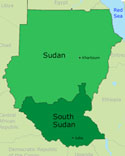 A series of protests in and around Khartoum after President Bashir’s announcement of a fiscal austerity program in June is the latest indication of a rapidly deteriorating political situation in Sudan. Almost a year since the establishment of South Sudan as the 193rd member of the United Nations, Sudan and South Sudan continue to face a host of complex issues unresolved by the Comprehensive Peace Agreement (CPA). Ongoing confrontations over border demarcations and sharing of oil revenue, along with an increasingly stressed economy in Sudan, are fueling discontent across the population, drawing the region nearer to political and economic crisis.
A series of protests in and around Khartoum after President Bashir’s announcement of a fiscal austerity program in June is the latest indication of a rapidly deteriorating political situation in Sudan. Almost a year since the establishment of South Sudan as the 193rd member of the United Nations, Sudan and South Sudan continue to face a host of complex issues unresolved by the Comprehensive Peace Agreement (CPA). Ongoing confrontations over border demarcations and sharing of oil revenue, along with an increasingly stressed economy in Sudan, are fueling discontent across the population, drawing the region nearer to political and economic crisis.
At a recent International Peace Institute meeting, participants discussed a number of short- and long-term suggestions to avert such an eruption and proactively generate change in a planned and peaceful manner. These were the key takeaways:
Key Conclusions
Parties in the region, with the help of the international community, should immediately begin taking steps toward planned and mindful change in the region.
The international community should maintain focus and pressure to assure that border-monitoring mechanisms laid out in Security Council Resolution 2046 of May 2, 2012 and in the June 29 border security agreement are effectively enforced.
Dialogue between the parties should recognize the concerns of marginalized communities in Sudan and South Sudan.
The Blue Nile and South Kordofan states should reengage in popular consultation as mandated by the CPA.
The international community should support inclusive dialogue by offering more “carrots,” including mediation and economic support and fewer “sticks,” such as sanctions and public condemnations.
Sudan should create an interim government of technocrats in Sudan not represented by any party, during which time a new constitution can be drafted. Sudan should encourage multiparty participation.
Analysis
While partly a consequence of a non-diversified economy, Sudan’s fiscal crisis and growing inflation rates are also affected by an inability to negotiate and implement its agreements with South Sudan. The government’s failure to strike a deal on oil revenues has placed additional stress on the people by harming the economy and necessitating the need for austerity measures that target already marginalized populations. Hence, long-time acrimony between north and south continues to complicate the region’s leading challenges.
Many observers believe the north/south hostility can be traced in part to past policies in Khartoum that asserted a single Arabic identity upon a multi-ethnic Sudanese population, often benefiting those willing and able to assimilate under such an identity. Non-Arabs in the south were unable to assimilate and were frequently marginalized as a result. Over time they began to cultivate an African identity that was increasingly separate from and defiant of the privileged identity in the north. This polarization contributed to increased tensions between the north and south and led to a civil war.
During the six-year implementation period of the CPA, both the north and the south missed numerous opportunities to repair this rift and to build cooperation and trust within the region. The international community allowed the rift to widen by shifting its focus to Darfur and other crises in the region and neglecting the unifying ambitions of the CPA.
Recent efforts by the international community have proven temporarily effective in dampening conflict, most notably through the African Union Roadmap of April 24, 2012, and Security Council Resolution 2046 of May 2, 2012. These documents have called on both countries to end hostilities in the disputed border areas and to reach a peaceful settlement on a range of outstanding issues from the CPA. The international community should maintain focus to assure that border-monitoring mechanisms are effectively enforced. Such minimizing of hostilities will produce a favorable environment for addressing the more complex longer-term challenges to sustainable peace.
Sustainable peace hinges on the level of inclusion taking place in dialogue and governance in the region. Sudanese should acknowledge that it is morally unattainable for either the north or south to forget each other. By asking, “What is the future of these countries?” the two countries can begin to discover areas of collaboration among different parties and begin building trust.
A key recommendation from the IPI meeting was that in order to institutionalize collaboration and inclusion, Sudan should reform its government to make it more representative of a diverse Sudanese population. Sudan needs a new constitution. In writing this constitution, the conversation should not be about secularism versus sharia law, since secularism would be counter to a representative democracy in Sudan. It should be about different norms of Islamic governance that don’t produce divisions within a diverse population.
Without planned and peaceful changes in governance and dialogue, today’s situation in Sudan and South Sudan is likely to continue to deteriorate.
Jon Grosh is the editor-in-chief at the Journal of International Affairs.




